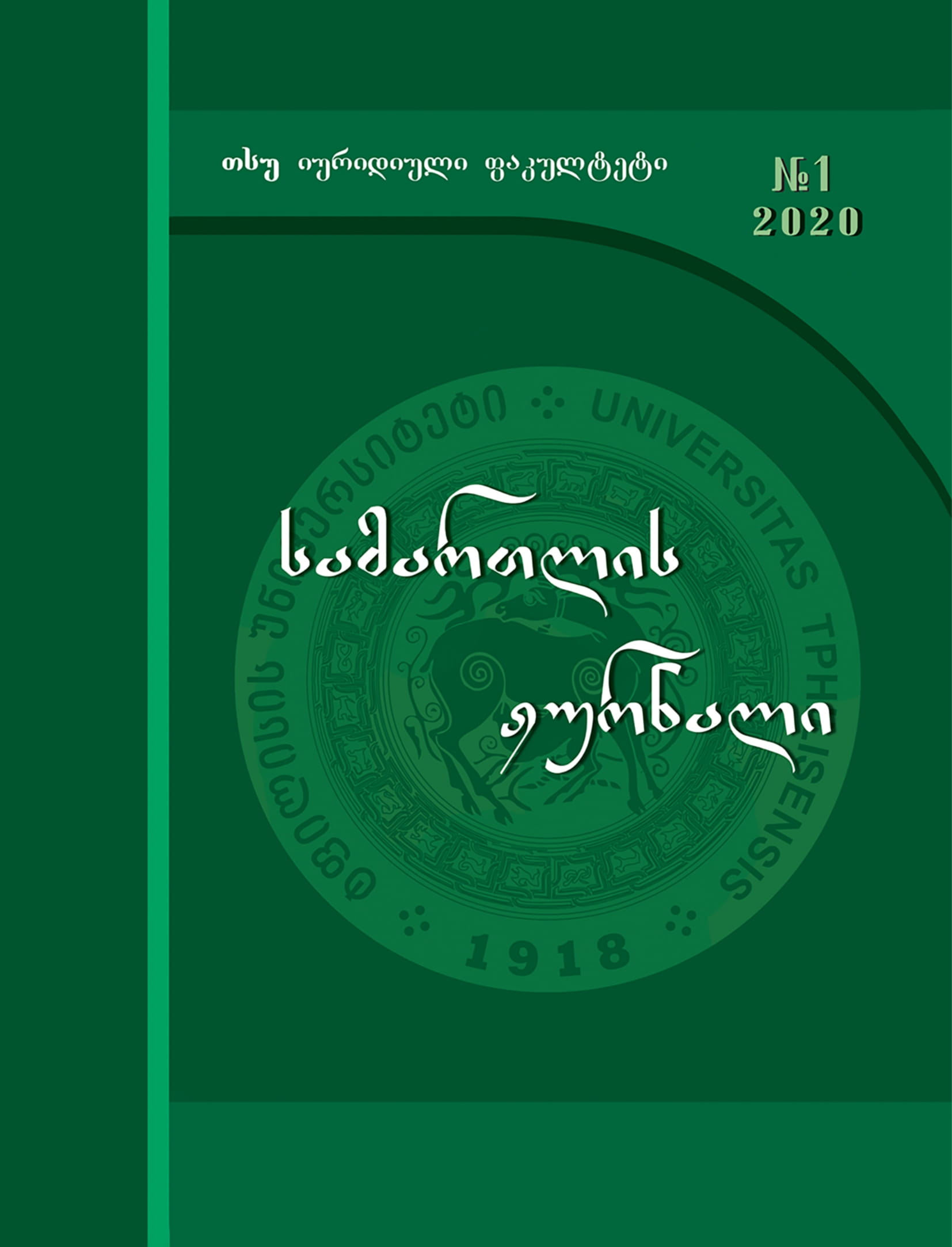კიბერშეტევა ძალის გამოყენების აკრძალვის კონტექსტში - საჭიროებს თუ არა საერთაშორისო სამართალი ახლებურ გააზრებას?
საკვანძო სიტყვები:
კიბერშეტევა, კიბეროპერაცია, კიბერსივრცე, ძალის გამოყენება, საერთაშორისო ჩვეულებითი სამართალი, საერთაშორისო სახელშეკრულებო სამართალი, ევოლუციური განმარტება, ტალინის სახელმძღვანელო პრინციპები, შიდა საქმეებში ჩარევა.ანოტაცია
თანამედროვე ტექნოლოგიების განვითარებასთან ერთად სულ უფრო აქტუალური ხდება საერთაშორისო სამართლის გადაფასების საკითხი, რათა შესაძლებელი გახდეს საერთაშორისო სამართლის სტატიკური ნორმების მიერ ტექნოლოგიების ადეკვატური რეგულირება. ერთ-ერთი ასეთი საკითხია კიბერსივრცე. არამართლზომიერი კიბეროპერაციებით სახელმწიფოები ხშირად არღვევენ სხვა სახელმწიფოების კიბერსივრცეს, რომლის ნათელი მაგალითებია 2007 წლის კიბერშეტევა ესტონეთზე, 2010 წელს ირანის ბირთვული სადგურის კომპიუტერულ სისტემაში აღმოჩენილი ვირუსი და 2008 წელს რუსეთ-საქართველოს შეიარაღებული კონფლიქტის დროს ქართულ კიბერსივრცეზე განხორციელებული თავდასხმა. ვინაიდან ამჟამად არ არსებობს კიბერსივრცეზე მორგებული სპეციალური რეგულაციები, ხშირად კნინდება საერთაშორისო სამართლის როლი.
ნაშრომი მიზნად ისახავს არსებული საერთაშორისო სამართლებრივი რეჟიმის განხილვას, რომელიც ვრცელდება კიბეროპერაციებზე. ამ კუთხით, ყურადღება გამახვილდება კიბეროპერაციების ურთიერთმიმართებაზე გაერთიანებული ერების ქარტიასთან, ძალის გამოყენების აკრძალვისა და სახელმწიფოთა შიდა საქმეებში ჩაურევლობის პრინციპებთან. სახელმწიფოთა პრაქტიკის ანალიზი აჩვენებს, რომ კიბერშეტევები სახელმწიფოების მიერ აღიქმება ძალის გამოყენების დამოუკიდებელ ფორმად და მათ სამართლებრივ შეფასებას ცდილობენ დღეს არსებული საერთაშორისო სამართლის ფარგლებში. ასევე, შეიმჩნევა კიბერშეტევების სპეციალიზებული ნორმებით მოწესრიგების ტენდენცია.
კიბერშეტევები საჭიროებს ახლებურ გააზრებას საერთაშორისო სამართლის ჭრილში. თუმცა, ეს არ ნიშნავს, რომ კიბერშეტევები ვერ ექცევა დღეს არსებული საერთაშორისო სახელშეკრულებო და ჩვეულებითი სამართლის ჩარჩოში და სცდება მისი რეგულირების ფარგლებს. ახლებური გააზრება საჭიროა მხოლოდ იმ ფარგლებში, რაც აუცილებელია კიბერშეტევების უკვე არსებულ საერთაშორისო სამართლებრივ ჩარჩოში ინკორპორაციისთვის.
წყაროები
United Nations Charter (Date of adoption: 26.06.1945; Entry into Force: 24.10.1945).
Statute of the International Court of Justice, Article 38.
Convention on Cybercrime, Council of Europe, ETS No. 185, (Date of adoption: 23.11.2001; Entry into Force 01.07.2004).
RFERL, Georgian Government accuses Russia of Waging “CyberWarfare” 12.08.2008,
<http://www.rferl.org/content/Georgian_Government_Accuses_Russia_Of_Cyberwar/1190477.html> [25.05.2020].
United Nations General Assembly Resolution 2131(XX) of 21 December 1965.
United Nations General Assembly Resolution 2625(XXV) of 24 October 1970.
United Nations General Assembly Resolution 55/28 of 20 November 2000.
United Nations General Assembly Resolution 56/19 of 29 November 2001.
United Nations General Assembly Resolution 59/61 of 3 December 2004.
United Nations General Assembly Resolution 60/45 of 8 December 2005.
United Nations General Assembly Resolution 61/54 of 6 December 2006.
United Nations General Assembly Resolution 62/17 of 5 December 2007.
United Nations General Assembly Resolution 63/37 of 2 December 2008.
United Nations General Assembly Resolution 64/25 of 2 December 2009.
United Nations General Assembly Resolution 65/41 of 8 December 2010.
United Nations General Assembly Resolution 66/24 of 2 December 2011.
United Nations General Assembly Resolution 67/27 of 3 December 2012.
United Nations General Assembly Resolution 55/63 of 4 December 2000.
United Nations General Assembly Resolution 56/121 of 19 December 2001.
United Nations General Assembly Resolution 58/32 of 8 December 2003.
United Nations General Assembly Resolution 59/61 of 3 December 2004.
United Nations General Assembly Resolution 60/45 of 8 December 2005.
United Nations General Assembly Resolution 61/54 of 6 December 2006.
United Nations General Assembly Resolution 62/17 of 5 December 2007.
United Nations General Assembly Resolution 63/37 of 2 December 2008.
United Nations General Assembly Resolution 64/25 of 2 December 2009.
United Nations General Assembly Resolution 65/41 of 8 December 2010.
United Nations General Assembly Resolution 66/24 of 2 December 2011.
United Nations General Assembly Resolution 66/359 of 14 September 2011.
United Nations General Assembly Resolution 67/27 of 3 December 2012.
United Nations Security Council (UNSC) Resolution 1696, 31 July 2006.
Articles on State Responsibility for Internationally Wrongful Acts, International Law Commission, 2001.
OSCE, Astana Commemorative Declaration — Towards a Security Community, SUM.DOC/ 1/10/Corr.1, 3 December 2010, § 9, <http://www.osce.org/cio/74985?download=true> [16.05.2020].
NATO, Active Engagement, Modern Defence. Strategic Concept for the Defence and Security of the Members of the North Atlantic Treaty Organisation, November 2010, §§ 7, 12.
San Remo Manual on International Law Applicable to Armed Conflicts at Sea, 12 June 1994, ICRC. https://www.icrc.org/ihl/INTRO/560?OpenDocument , [25.05.2020].
Final Act, Conference on Security and Co-Operation in Europe, 1975.
International Humanitarian Law Institute, Rules of Engagement Handbook. September 2009, 15.
US Department of Defense, The Strategy for Homeland Defense and Civil Support, June 2005, 12.
Albright D., Brannan, P., Walrond, C., Did Stuxnet Take Out 1,000 Centrifuges at the Natanz Enrichment Plant?, Institute for Science and International Security, 2010, http://isis-online.org/uploads/isis-reports/documents/stuxnet_FEP_22Dec2010.pdf , [22.05.2020].
Beyerlin U., Stoutenburg J. G., International Protection of Environment, Max Planck Encyclopedia of Public International Law, Oxford University Press, 2015, §§ 2, 8, 21, 30.
Bjorge E., The Evolutionary Interpretation of Treaties, Oxford University Press, 2014, 1-22.
Cannizzaro E., (ed.), The Law of Treaties Beyond the Vienna Convention, Oxford University Press, 2011, 125.
Cassese A., (ed.), The Oxford Companion to International Criminal Justice, Oxford University Press, 2009, 19-20.
Cyber Attacks Disable Georgian Websites, Ministry of Foreign Affairs of Georgia
Damrosch L., Politics Across Borders: Nonintervention and Nonforcible Influence of Domestic Affairs, American Journal of International Law, Vol. 83, 1989, 2-3.
Dinstein Y., Cyber War and International Law: Concluding Remarks at the 2012 Naval War College International Law Conference, International Law Studies, Vol. 89, 2013, 280.
Ergma E., Speaker of the Estonian Parliament, ციტირებული: Davis, J., Hackers Take Down the Most Wired Country in Europe, Wired Magazine (21 August 2007) https://www.wired.com/2007/08/ff-estonia/ [23.05.2020].
“Iran Briefly Halted Enrichment”, Aljazeera (23 November 2010). <http://www.aljazeera.com/news/middleeast/2010/11/201011231936673748.html> [11.05.2020].
“Iran says Cyber Foes Caused Centrifuge Problems” Reuters (29 November 2010). <http://www.reuters.com/article/iran-ahmadinejad-computers-idAFLDE6AS1L120101129> [24.05.2020].
Jamnejad M., Wood, M., The Principle of Non-Intervention, Leiden Journal of International Law, Vol. 22, 2009, 348.
Jennings R., Watts A., Oppenheim's International Law, 9th ed., Vol. 1 Peace, Oxford University Press, 2008, 429.
Katz Y., Stuxnet Virus Set Back Iran’s Nuclear Program by 2 Years. Jerusalem Post, Jerusalem, 15 December, 2010, http://www.jpost.com/IranianThreat/News/Article.aspx?id=199475 , [26.05.2020].
Kanuck S., Recent Development: Information Warfare: New Challenges for Public International Law, Harvard International Law Journal, Vol. 37, 1996, 288.
Korns S. W., Kastenberg J. E., Georgia's Cyber Left Hook, Small Wars Journal Parameter, Winter Edition, 2008-2009.
Markoff J., “Before the Gunfire, Cyberattacks”, The New York Times, 2008, <http://www.nytimes.com/2008/08/13/technology/13cyber.html?_r=0> [17.05.2020].
Report of the Independent Fact-Finding Mission on the Conflict in Georgia, Vol. II, September 2009, 217–219.
Russia Accused of Unleashing Cyberwar to Disable Estonia. The Guardian (17 May 2007) https://www.theguardian.com/world/2007/may/17/topstories3.russia#maincontent , [09.05.2020].
Roscini M., Cyber Operations and the Use of Force in International Law, Oxford University Press, 2014, 3-4, 21-23, 25-26, 32-33, 44-45, 47.
Salinas de Frias, A. M., et al. (ed.), Counter-Terrorism: International Law and Practice, Oxford University Press, 2012, 1005, 1006.
Schmitt M. N., Tallinn Manual on the International Law Applicable to Cyber Warfare, Cambridge University Press, 2013, 5, 45, 54-55.
Scmitt M. N., Wired Warfare: Computer Network Attack and Jus in Bello, International Review of the Red Cross, Vol 84, Issue 846, 2002, 365-399.
Shakarian P., Stuxnet: Cyberwar Revolution in Military Affairs. Small Wars Journal, 2011, 1, 7.
Simma B., et al (eds.), The Charter of the United Nations: A Commentary, Vol. I, 3rd ed., Oxford University Press, 2012, 210.
Steed D., The Strategic Implications of Cyber Warfare, Cyber Warfare: A Multidisciplinary Analysis, Green J., A., Routledge, 2015, 78.
Swaine J., “Georgia: Russia ‘Conducting Cyber War’”, The Telegraph, 2008. http://www.telegraph.co.uk/news/worldnews/europe/georgia/2539157/Georgia-Russia-conducting-cyber-war.html , [17.05.2020].
Thurer D., Soft Law. Max Planck Encyclopedia of Public International Law, Oxford University Press, 2009, §§5, 9, 15.
Thirlway H., The Sources of International Law, Oxford University Press, 2014, 117-128, 165.
Tikk E., Kasha K., Vihul L., International Cyber Incidents: Legal Considerations, Cooperative Cyber Defence Centre of Excellence, 2010, 16-17, 19.
Weller M., (ed.), The Oxford Handbook of the Use of Force in International Law, Oxford University Press, 2015, 1112, 1114-1116.
Woltag J. C., Computer Network Operations below the Level of Armed Force, European Society of International Law Conference Paper Series, 2011, 1, 5. https://papers.ssrn.com/sol3/papers.cfm?abstract_id=1967593 , [26.05.2020].
Dispute Regarding Navigational and Related Rights (Costa Rica v. Nicaragua), ICJ, Judgment, 13 July 2009, §§ 49-52, 66.
Case Concerning Application of the Convention on the Prevention and Punishment of the Crime of Genocide (Bosnia and Herzegovina v. Serbia and Montenegro), ICJ, Judgment, 26 February 2007, §§ 385, 398.
Oil Platforms case (Iran v. USA), ICJ, Judgment, 6 November 2003, §52.
Legality of the Threat or Use of Nuclear Weapons, ICJ, Advisory Opinion, 8 July 1996, §§ 39, 78.
The Prosecutor v. Dusko Tadic, ICTY, Decision on the Defence Motion for Interlocutory Appeal on Jurisdiction, Case IT-94-1, 2 October 1995, § 99.
Military and Paramilitary Activities in and against Nicaragua (Nicaragua v. US), ICJ, Judgment, 27 June 1986, §§ 187–190, 202, 205- 207, 212, 534.
Rees v the United Kingdom, ECtHR, Judgment, 17 October 1986, Series A, No. 106, § 47.
Rasmussen v Denmark, ECtHR, Judgment, 28 November 1984, Series A, No. 87, § 40.
Guzzardi v Italy, ECtHR, Judgment, 6 November 1980, Series A, No. 39, §9.
Ireland v United Kingdom, ECtHR, Judgment, 18 January 1978, Series A, No. 25, § 239.
North Sea Continental Shelf (Germany v. Denmark/The Netherlands), ICJ, Judgment of 20 February 1969, §77.
Fisheries Case (United Kingdom v. Norway), ICJ, Judgment, 18 December 1951.
SS Lotus Case (France v Turkey) [1927] PCIJ Rep Series A. No. 10, 18.
ჩამოტვირთვები
გამოქვეყნებული
როგორ უნდა ციტირება
გამოცემა
სექცია
ლიცენზია

ეს ნამუშევარი ლიცენზირებულია Creative Commons Attribution-ShareAlike 4.0 საერთაშორისო ლიცენზიით .









